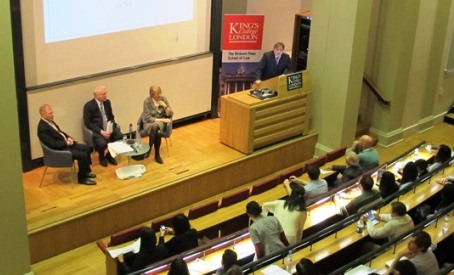North Korea: Findings of the UN Commission of Inquiry of Human Rights
 On 21 March 2014 Justice Michael Kirby and Ms Sonja Biserko visited King’s College London to discuss the report of the United Nations Commission of Inquiry on human rights in the Democratic People’s Republic of Korea (DPRK).
On 21 March 2014 Justice Michael Kirby and Ms Sonja Biserko visited King’s College London to discuss the report of the United Nations Commission of Inquiry on human rights in the Democratic People’s Republic of Korea (DPRK).
The presentation at King’s was one of main events in London designed to disseminate the findings of the report to the public. The special event was jointly hosted by The Dickson Poon School of Law, the Department of War Studies and the British Institute of International and Comparative Law (BIICL). It was introduced by Professor James Gow and chaired by Professor Robert McCorquodale.
It attracted over 250 people, including NGO representatives, journalists, solicitors, barristers, academics, and students of international law from King’s and surrounding universities.
The report found that a wide array of crimes against humanity, arising from “policies established at the highest level of State,” have been committed and continue to take place in the DPRK. It calls for urgent action by the international community, including referral to the International Criminal Court, targeted sanctions and people-to-people contact to promote change internally.
Justice Michael Kirby discussed how the Commission held the public hearings around the world and conducted more than 240 confidential interviews. He noted that he was deeply moved by their stories and even had to pause the proceedings three times due to the devastating nature of the crimes being described. He shared with the audience the 10 lessons to be learned from the Commission’s experience, including the growing influence of public international law, the essential need to listen to the voice of the people, the value of civil society and an able Secretariat, and the importance of follow-up. He and Ms Biserko engaged in a lively dialogue with the audience, answering questions about the definition of genocide, the prospects of action by the Security Council, and the role of the media and national courts.
Dr Philippa Webb, Lecturer in Public International Law, observed that the event had shone a light on a situation of grave human rights violations that had long been ignored by the international community. She said, ‘Justice Kirby gave us an insight into the horrors, complexities and frustrations of the totalitarian regime in North Korea, but he also gave us hope that pressure and sustained attention from multiple actors, including ordinary people, can help bring about change’.
The Commission of Inquiry formally presented its report to the 47 Member States of the Human Rights Council, in Geneva, on 17 March 2014.
Find out more about the Commission of Inquiry on Human Rights in the Democratic People’s Republic of Korea (DPRK) on the United Nations Human Rights Council website.
See forthcoming events in The Dickson Poon School of Law.